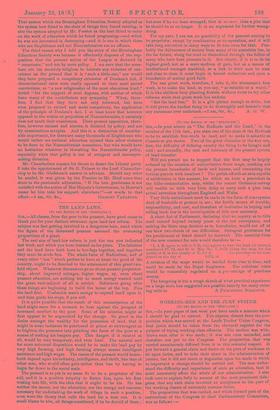THE LAND LAWS.
[TO THE Emma OF THE "SPECTATOR:1
aSin,—All classes, from the peer to the peasant, have good cause to thank you for your distinct utterance upon land-law reform. The --subject was fast getting involved in a dangerous haze, amid which the figure of the distressed peasant assumed the overawing proportions of a giant.
The real aim of land-law reform is just the one you indicated last week, and which you have insisted on for years. The labourer -and the land have both been in bondage together, and together they must be made free. The whole force of Radicalism, and of -every other " ism" which prefers to have at heart the good of the -country, ought to be directed to the attainment of this great two- fold object. Whatever discussions go on about peasant proprietor- ship, about improved cottages, higher wages, ay, even about peasant education, are nothing but so much energy wasted until the great root-subject of all is settled. Reformers going after 'these things are beginning to build the house at the top. Free the land first. Unshackle man's energy to expend itself upon it, and then guide his steps, if you will.
It is quite possible that the result of this emancipation of the lend might seem for a moment to bear against the prospect of increased comfort to the poor. Some of his miseries might at first appear to be augmented by the change. So great is the desire amongst the wealthy for the possession of land, that it might in some instances be purchased at prices so extravagent as to frighten the possessor into grinding the faces of the poor as a means of making his bargain pay. This danger, if it existed at all, would be very temporary, and even local. The natural and far more universal disposition would be to make the laud pay by very high farming, and high farming always means intelligent assistance and high wages. The career of the peasant would hence- forth depend upon his industry, intelligence, and thrift, like that of ether men, who would often gain rather than lose by having to begin far down in the social scale.
The peasant is as yet in no sense fit to be a proprietor of the soil, and it is a positive iniquity to flatter him, upon his first waking into life, with the idea that it ought to be his. He has neither the means, nor the education, nor the energy and resource necessary for undertaking the work of tillage in such a position, even were the theory that calls the land his a true one. It is small blame to him, all things considered, if he be devoid of these ;
but even if he has been wronged, that is no more than a plea that he should be so no longer. It is no argument for further wrong- doing.
For my part, I can see no possibility of the peasant coming to be proprietor, except by combination or co-operation, and it will take long education in many ways to fit him even for that. Pro- bably the deliverance of society from many of its anarchies lies, in the far future, along the road so discredited through the follies of many who have been pioneers in it. But clearly, if it is to do its highest good, not as a mere medium of gain, but as a means of brotherhood amongst mankind, as a link to bind man to man and class to class, it must begin in honest endeavour and upon a foundation of mutual good faith.
The one great work, therefore, 1 take it, the statesman's first work, is to make the land, as you say, " as saleable as a watch." It is like children busy planting flowers without roots to try other reforms while that great work lies undone.
" Set the land free." It is a glib phrase enough to write, but it will prove the hardest thing to do thoroughly and honestly that any statesman ever undertook.—I am, Sir, &c., A. G. W.


































 Previous page
Previous page